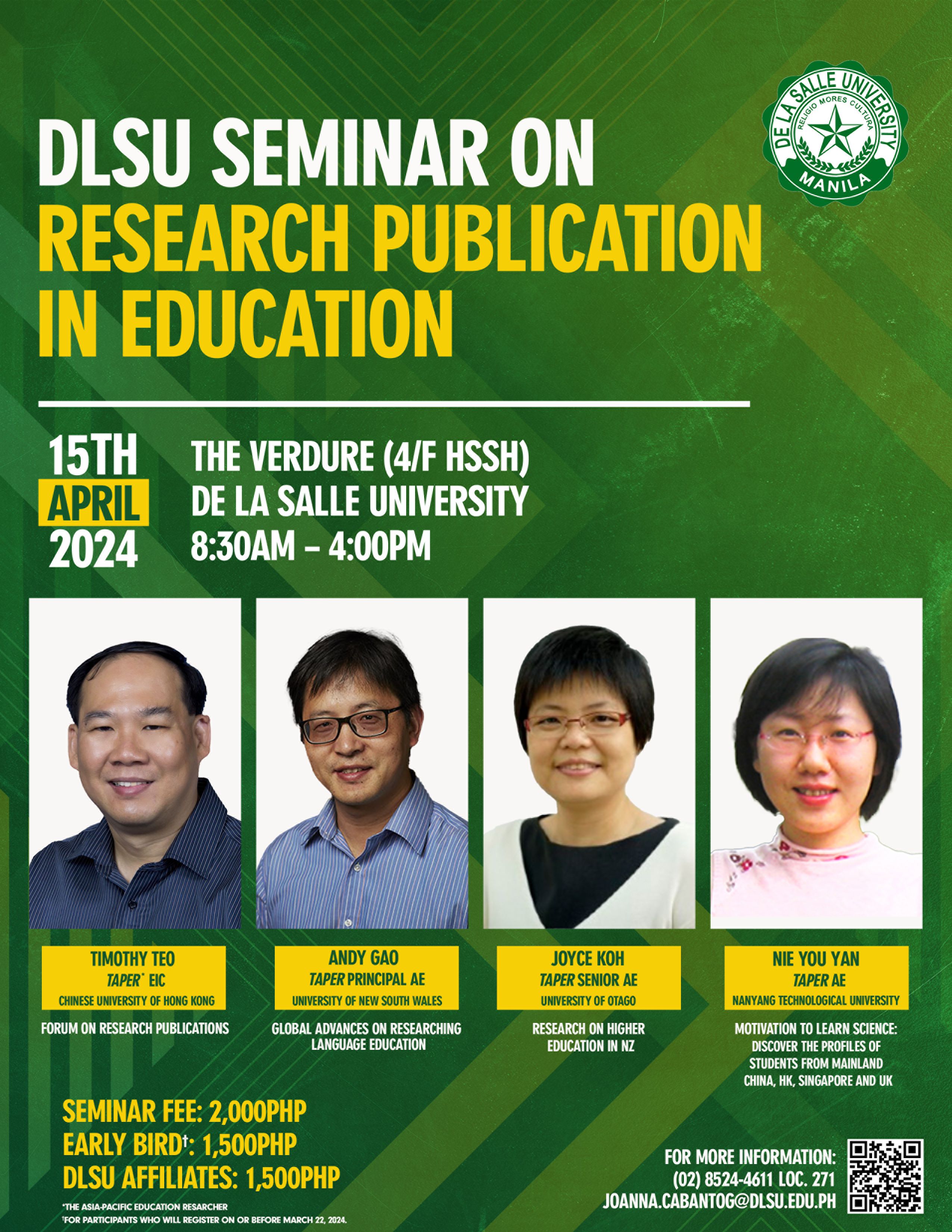Featured Seminar
DLSU Seminar on Research Publication in Education

We would like to invite you and our colleagues in Ateneo to join us in the forthcoming DLSU SEMINAR ON RESEARCH PUBLICATION IN EDUCATION. I believe that the lectures -- to be given by the Editor-in-Chief as well as the Associate Editors of THE ASIA-PACIFIC EDUCATION RESEARCHER (TAPER) -- concerning education, educational psychology, and research publication in top tier journals (i.e., ISI-listed) will be of interest to your colleagues.
About the Speakers
Timothy Teo is professor of education at The Chinese University of Hong Kong and the editor-in-chief of The Asia-Pacific Education Researcher. Besides CUHK, Professor Teo is an adjunct professor at Murdoch University and Edith Cowan University (Australia), honorary chair professor at the National Tsing Hua University (Taiwan), distinguished visiting professor at the University of Johannesburg (South Africa), and visiting professor at the Universiti Tunku Abdul Rahman (Malaysia). A highly published and cited scholar, he has edited three books and written many book chapters and conference papers, and published over 200 peer-reviewed journal articles, with 155 in highly ranked SSCI journals. His Google Scholar citations are over 18,000 with an H-index of 70.
Andy Gao is a professor at the School of Education, University of New South Wales, Australia. His research interests include international students’ educational experiences, language learner agency, language and literacy education, language education policy, and language teacher education. His research on the use of sociocultural/ecological perspectives to understand language learner's strategy use and language teacher agency has appeared in journals such as English Language Teaching Journal; Journal of Language, Identity and Education; Language Teaching; Language Teaching Research; Studies in Higher Education; System; Teaching and Teacher Education; and TESOL Quarterly.
Joyce Koh is an associate professor in higher education at the University of Otago. Her research focuses on educational technology and on facilitating educators in translating educational technology theories into usable and effective pedagogical practices. Her research work has contributed validated surveys for the assessment of teachers' confidence in their technological pedagogical content knowledge (TPACK) for constructivist-oriented pedagogies, as well as design rubrics and TPACK design processes to support educators' creation of student-centered learning practices.
Nie Youyan is an associate professor with the Psychology and Child & Human Development Academic Group, National Institute of Education, Nanyang Technological University. Her research interests include motivation in education, self-regulated learning, and innovation in curriculum, instruction, and assessment. She has taught psychology at various levels (i.e., graduate, undergraduate, and secondary) since 2001. She also worked as a counselor in the Mental Health Center, Northeast Normal University (China).
Link to Registration:

St. Louis Catholic Archives Visiting Research Grant 2024
The Center for Research on Global Catholicism (CRGC) at Saint Louis University is delighted to announce the 2024 St. Louis Catholic Archives Visiting Research Grant.
The grant offers two scholars up to $3000 per year to defray costs connected with conducting research at participating archives:
- Sisters of St. Joseph of Carondelet Consolidated Archives
- St. Louis Visitation Archives
- Archdiocesan Archives of St. Louis
- Saint Louis University Archives
The St. Louis Catholic Archives Collective (SCAC) is an initiative partnering the Center for Research on Global Catholicism at SLU with archivists at multiple independent local Catholic archives to increase the visibility and accessibility of their collections, particularly those collections that illuminate the histories of women religious. Researchers pursuing projects that would benefit from the rich resources of the SCAC archives are invited to apply. Projects that focus on women's religion are especially encouraged. We welcome applications from academics of all ranks and disciplines, independent researchers, students 18 years and older, genealogists, and others.
Worldwide Cancer Research Discovery Research Grants
Our goal is to support research that seeks to answer the difficult questions in cancer biology. We are looking for innovative and truly novel ideas that have the potential to revolutionise our understanding of cancer and how to beat it.
We award project grants of 12 to 36 months in length to support basic, fundamental or translational research into the prevention, diagnosis or treatment of cancer. We do not prioritise any field of research within this; we welcome research that draws on epidemiological, behavioural and clinical data to provide a starting point for a new avenue of research. Multidisciplinary or discipline-hopping projects are encouraged where this helps stimulate innovation.
The research described in your application should be a discrete, hypothesis-driven project, achievable within the duration of the support requested. Do not describe a large programme of work - for example the work of your entire laboratory - and then request a contribution towards it - for example funding one member of the laboratory or part of the consumable costs.
Please see our Research Strategy and application handbook for more details.
Thrive Philanthropy Grants
Thrive offers various grant opportunities for initiatives that aim to eliminate industrial animal agriculture, create just, plant-based food systems, reduce animal consumption, and for vegan advocacy.
- Proposals that aim to create just, vegan food systems by reducing the consumption of animals, reducing industrial animal agriculture, or for vegan advocacy.
- Aligns with Thrive Philanthropy’s safespace policy.
- Outside the United States and/or are not an international chapter of a US-based organization.
- Applicants must consistently demonstrate a positive reputation with their stakeholders and community and can contribute to Thrive Philanthropy’s positive reputation.
- Not a for-profit company.
- We occasionally fund individuals at smaller amounts, however, most Thrive Grants are directed to organizations. (Please see our other grants for grants suited toward individuals.)
- We are currently prioritizing organizations with a budget less than $500,000 USD
Standards and trade development facility Grants
Project Preparation Grants (PPG)
Funds up to US$50,000 are available for PPGs to prepare technically sound, innovative and sustainable projects. These grants can involve the application of SPS-related capacity evaluation tools, preparation of feasibility studies and/or formulation of project proposals to address specific SPS capacity building needs linked to trade.
Applications are accepted in any of the three working languages of the STDF (English, French and Spanish) and should be submitted by e-mail to: stdf.funding@wto.org
Project Grants (PG)
Funds up to US$1,000,000 are available for PGs that improve food safety, animal and plant health capacity to comply with international sanitary and phytosanitary (SPS) requirements. These grants are expected to help address SPS challenges or issues that affect trade to international markets.
Applications are accepted in any of the three working languages of the STDF (English, French and Spanish) and should be submitted by e-mail to: stdf.funding@wto.org
Ovarian Cancer Research Alliance (OCRA) Grant 2025
OCRA runs one grant cycle each year. Requests for Proposals (RFPs) are issued the first quarter of every year. We use a two step application and peer review process. Letters of Intent (LOIs) are due in early spring and undergo a rigorous peer review by our Scientific Advisory Committee. After LOI review, a subset of those applicants are invited to submit full proposals. Final grant notifications are made in the fall. (This timeline is subject to change.)
The review process—including all meeting deliberations, scores and written critiques of proposals, as well as other materials provided for the review of proposals—is confidential. A confidentiality and conflict-of-interest statement must be signed by each reviewer. Grants for projects selected through this process are then made to non-profit medical institutions on behalf of individual investigators or project directors. Please note that due to the small size of the OCRA staff and Scientific Advisory Committee, we are not able to provide feedback to applicants on their LOIs or Full Proposals.
Have questions about OCRA’s grant cycle and programs? View our FAQs.
Awards
Young Champions of the Earth Award
In 2024, Young Champions of the Earth will be selected, one from each global region: Africa, Europe, Latin America and the Caribbean, North America, West Asia and two from Asia and the Pacific. Each winner will receive:
1. Mentorship, capacity building workshops and access to a UN community of experts
2. An introduction to dignitaries at the Young Champions of the Earth award ceremony
3. Publicity and recognition through interviews and online and global media
4. US$20,000 in seed-funding
5. The 2024 Young Champions of the Earth will be required to share their journeys through videos and blogs on this website for up to one year. If you have at least 6 months experience working on a big idea to protect or restore the environment and will be aged between 18 and 30 on 31 December 2024, you are eligible to apply
The Iris Project Prizes (For ages 16-24 yrs old)
We specifically look for projects that are:
1. Youth and locally-led initiatives operating in areas identified as significant by their local communities.
2. Eligibility for consideration includes ideas, small-scale projects, or existing initiatives with growth potential and replicability.
3. We prioritise initiatives in the Global South, where our support can have a more significant impact. But we also consider exceptional projects from the Global North.
4. Shown to have a Commitment to diversity and inclusion.
The Seed Prize
Awarded to a young person or team with a groundbreaking idea to protect and/or restore nature in their local community.
Maximum Funding: 5,000.00 USD
The Stem Prize
Awarded to an existing project established recently and on a small scale.
Maximum Funding: 10,000.00 USD
The Iris Prize
Awarded to an established project with the potential to replicate and scale.
Maximum Funding: 15,000.00 USD
|






